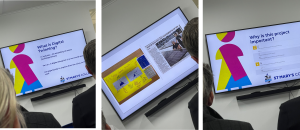It was wonderful to attend the Learning Environments Australasia Conference last week in Adelaide, so exciting to be back at a large learning event in person! It was also important to note that even though the title of the conference might make us first think that all of the chat would be about physical environments but in actual fact everyone was talking about all of the other facets of the ecosystem that as educators we know to be so important.

The first Keynote of the conference was Helen Connolly who is the SA commission we for children and young people. Her message was about seeing children as citizens with rights, the importance of engaging children as key stakeholders in school decision making and that this is actually mandated in article 12 of the UN Convention on the rights of a child. Helen is engaging in some excellent stakeholder engagement with the young people in South Australia and as a result is developing some excellent data about what children and young people care about. I can highly recommend spending some time on her website. https://www.ccyp.com.au/the-commissioner/
The second Keynote was Dr Kristin Alford who is a futurist and has developed the MOD museum in Adelaide designed to engage people in futures thinking. https://mod.org.au/
She shared some interesting perspective on futures thinking and the role of technology in futures. In particular I found her unpacking of what it means to take a “200 year present” perspective. This involves making decisions be considering what our grandparents would think and what our grandchildren would think. Her belief is that this kind of thinking helps us to sharpen and live out our values and perhaps change our decision making in the now. Her belief is that we will all become agents for change if we have a positive view of the potential future combined with a level of anger or frustration about aspects of the present that will help to motivate us and drive us forward.
The combination of these two mindsets will drive the belief that you can make a difference and the motivation to make it happen. I think this is very apt for the work that we do in education, particularly in the area of contemporary transformation. There is often much reference to the fact that children in our primary schools today are preparing for jobs that likely don’t exist yet. Dr Alford had some interesting perspective on this saying that Law and Medicine roles are likely to change significantly and require a very different skill set in the future than they do now and that two roles she predicts will be grief counsellors for global systems and data storytellers.
Another very interesting Keynote was Prof. Pasquale Quester who is the Vice Chancellor of Swinburne University who talked about her vision for the university and her understanding of the new role in education which is to be a curator of the experiences that lead people to learning. And finally some wise words from Louka Parry, who talked about the need for all in education to awaken the fire in young people not just to contribute to a powerful economy but also to a more just and equitable world.
On one of the school tour visits I went to St Mary’s College who have had students from year 4-12 partner with a Digital Twinning company to create a digital twin of their new building in order to record how much energy output it is creating compared to input from the solar panels that have been installed. The girls involved in the project spoke articulately about what it has been like to be part of such an authentic learning experience. They have just finished a grant submission to fund the next part of the project which will see them double their solar panel footprint and install an EV charging station which will bring them closer to the College goal of being carbon neutral by 2025. It was inspiring to see learners speaking alongside industry partners and to hear about girls in year 8 earning SACE credits.
Kim Powell
Learning Leader: Innovation
